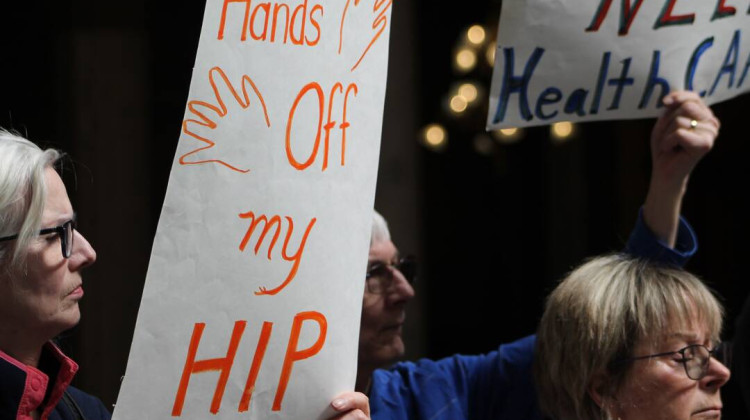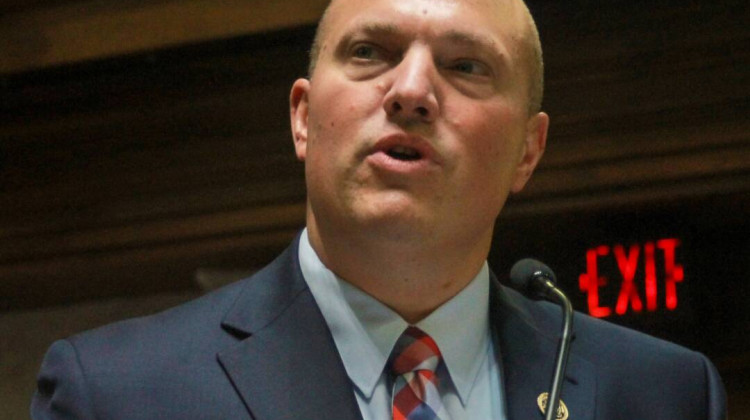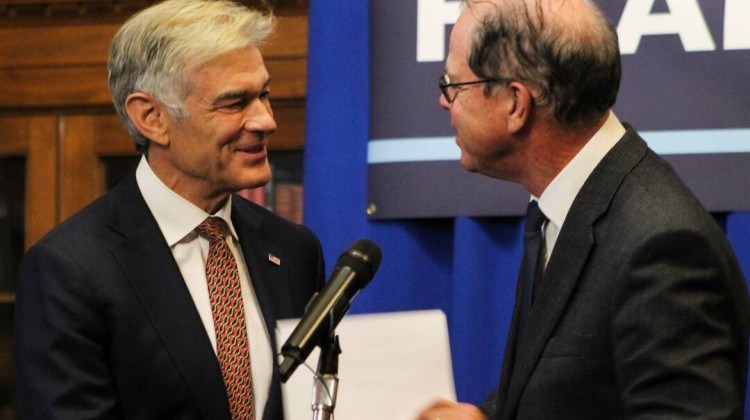By Becca Costello and Sarah Fentem
November 1 marked the first day of 2018 open enrollment, the period in which people can sign up for insurance through healthcare.gov. The Affordable Care Act has been through the legislative wringer this year, and there are plenty of changes this period for people buying insurance on the marketplace. WFIU’s Becca Costello and Side Effects Public Media’s Sarah Fentem answer some open enrollment questions — with the help of some policy experts.
First up: Is Obamacare still around?
In short, yes.
Despite multiple attempts by Congressional Republicans to repeal the Affordable Care Act, it still remains the law of the land. This comes despite President Donald Trump declaring “there is no such thing as Obamacare anymore.”
If you were confused, Shelby Gonzales of the Center for Budget and Policy Priorities wouldn’t blame you.
“There’s a whole lot of mixed messages happening,” she said. “It’s going to be a challenging enrollment season.”
OK, the Affordable Care Act is still in place. Does that mean I still have to buy insurance?
Yes. The rule — formally called the individual mandate — is still intact.
That said, how successful the individual mandate will be relies on perception, said David Anderson of Duke’s Margolis Center for Health Policy.
“It’s not whether or not it will be enforced, it’s whether or not people believe it will be enforced,” Anderson said. “As far as we know, there’s no messaging coming from the Trump Administration that the mandate will be enforced.”
However, the IRS has said it will still recognize the requirement, saying this year, it won't accept silent returns on tax documents, which are returns that don’t indicate whether or not the filer has minimum health care requirements as defined by the ACA.
The bottom line: The law says people still need to buy insurance, but whether or not they will is up for debate.
How many insurance providers are left on the Indiana exchange?
This year only two insurers, CareSource and MHS Indiana (also known as Centene or Celtic) will offer exchange plans on the Indiana marketplace during 2018 enrollment. That’s down from four insurers in 2017 and seven in 2016.
MDwise and Anthem were the only two companies available in every Indiana county when they announced their departure in June. Even so, there are no “bare” counties in Indiana this year. Every county will have coverage, but some have only one option.
Bloomington-based consultant Christopher Schrader said that puts Indiana at about the same level of choice as most other states.
“Much of the rest of the nation has not had much of a choice [when it comes to insurers],” Schrader said.
“In Indiana, we’ve been quite fortunate to have a selection over the course of the years, but that finally caught up with us."
Why are there fewer options this year?
Insurers Anthem and MDWise cited uncertainty and volatility in the federal marketplace when they pulled out last summer.
The government has historically helped out marketplace insurers (see below), but it was unclear whether the Trump administration was as supportive of this assistance, and some insurers didn’t want to take the chance.
I heard something on the news about subsidies being discontinued. Does that mean I won’t receive assistance?
People under a certain income level will still receive discounts as they have in the past — that’s provided for in the Affordable Care Act.
But insurance companies offering plans on the marketplace received subsidies from the government, too, with the goal of offsetting any losses they experience by covering lower-income people. This provision was a little more controversial — it’s been the target of lawsuits, in which opponents say the money was never OK’d by Congress and the funding for cost-sharing reductions was never appropriated for by the government.
The Trump Administration ruled this to be the case earlier this fall, and announced the cost-sharing reductions for insurers weren’t legal.
Insurance companies had been wary of the federal government’s wavering over cost-sharing reductions and many set their 2018 premiums with the belief they weren’t going to receive CSRs in 2018. As a result, average rates in Indiana climbed higher for this coming enrollment (even though experts say those increases in costs for most buyers will be offset by the federal consumer subsidies.)
What will I pay?
As in the past, it depends on what plan one buys and how much money one makes. Caresource and MHS raised their average premiums by 20 and 26 percent respectively this period. In Indiana, the average 2018 premium hovers around $500 per month.
Schrader said people at the income level where the coverage is subsidized will be largely shielded from the increased premiums. People who will pay the most are upper-middle class self-employed people, who make too much to receive discounts that weather the premium increases.
“The people who are bearing the full brunt of that increase in the marketplace are the folks who ... make too much money on a household level to be subsidized, so they are taking the full hit of that increase and that’s pretty dramatic,” Schrader said. “And quite frankly, when we forecast what will happen to enrollment through this open enrollment period, that’s the cohort that we expect will probably drop out the most because they simply can’t afford the policies."
In some states, to make up for the loss of federal assistance, insurance companies hiked premiums in benchmark “silver’” plans but not in gold or platinum plans, so better coverage is available for a lower price. However, in Indiana, those costs were taken into account for all metal levels.
“Indiana decided to load all the CSR costs into plans, so there will not be any unusually good deals,” said Margolis Center's Anderson.
Where can I get help enrolling in coverage?
Enrollees can get free in-person help from a certified healthcare navigator in Indiana. You can make an appointment directly with a navigator in your area.
Agents and brokers representing the actual insurance companies can also provide assistance. Find a list of agents and brokers in your area on the ACA website.
Browse the frequently asked questions on HealthCare.gov or contact federal ACA officials at 1-800-318-2596.
Will I have as much help in enrolling for coverage?
The federal government hasn’t been as gung-ho about helping get the word out about healthcare.gov this season, most notably cutting funds distributed to health navigators, who are essentially professional insurance signer-uppers.
First, the Centers for Medicare and Medicaid Services announced over the summer it wouldn’t be renewing contracts with certain organizations offering navigator programs. Then, in late August, the agency announced it was cutting grant funding for navigator groups in states that use the federal marketplace — organizations such as the Affiliated Service Providers of Indiana, or ASPIN.
CMS said it’s focusing its energy on strategies it knows work and trimming funding on ineffective initiatives. The new cuts come from the organization pinning funding on how successful an agency is at enrolling people (though navigator groups say that’s only a portion of what enrollment assistance does.)
However, Schrader said after several years of open enrollment, most people will have gotten the hang of choosing a plan.
“When you look at where we are in our iteration of open enrollment for the ACA, we have a cohort of very experienced people,” he said. “They’ve been through this enrollment process before, they know how it works, and they should be able to do so with little assistance.”
Schrader said it’s imperative that people sign up without assistance if possible, in order to free up time for the navigators to help people signing up for the first time.
When can I enroll? Why is the deadline closer this year?
Enrollment started Nov. 1 and runs through Dec. 15. This year’s enrollment period is cut in half (the period has traditionally lasted 12 weeks, not six.)
Certain pundits were cynical about the change, arguing the measure was part of a Trump Administration plan to “let Obamacare Fail.”
But insurers had been pushing for a shorter enrollment period for some time, said Anderson. Ultimately, it could save them money, since in a prolonged enrollment window, the most unhealthy people sign up immediately and rack up an extra month of claims, while healthier people sign up toward the end of an enrollment period. A shorter enrollment period — that ends before the first of the year — puts patients into the same risk pool.
Schrader said although the enrollment process may be easier for people who have gone through it in the past, that experience could also be a detriment.
“One of the things about being acclimated to the past, while the process may be easier for you, now it’s also not as lengthy, so you don’t have the time you thought you had before,” he said.
How will all these changes affect the future of the exchange?
Ultimately, CBPP’s Gonzales said the end result of the mixed messaging from Washington, the shortened enrollment period, the discontinuing of cost-sharing reductions and fewer choices on the exchange will be hard to measure.
“Certainly, it will be very difficult to attribute a reduction in enrollment because of just one of these items, because all of them are happening at once,” she said
Last year, close to 175,000 Hoosiers enrolled in health care plans through the Affordable Care Act exchange during open enrollment.
This story was produced by a collaboration between WFIU News and Side Effects Public Media, a reporting collaborative focused on public health.
 DONATE
DONATE







 View More Articles
View More Articles




 Support WFYI. We can't do it without you.
Support WFYI. We can't do it without you.